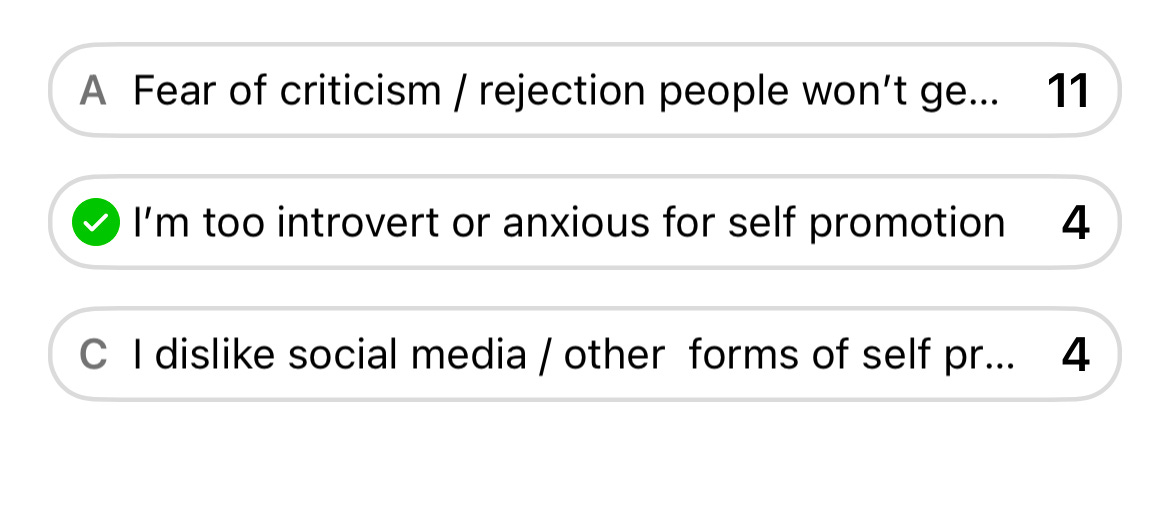How to overcome your fear of sharing your new business in public
If no one knows about your business you won't be able to grow. But many experience fears when it comes to sharing. Learn how to move past them, ft. Alessandra Scicchitano
Huge welcome to the 129 new subscribers! I share tactics and actionable strategies to help you build your early-stage business. I’m a certified coach supporting new founders for The Ask®.
The new business owners’ dilemma
For the majority of business owners, when you first begin you are an unknown entity. Aside from your inner circle, it is likely that no one knows you or your business, and no one really cares. Sorry.
But the good news is that almost all the businesses we know and love started in the exact same place.
Even Netflix, a business we’ve spent more hours with than we might care to admit, began as an unknown entity.
We forget that many of the biggest businesses were at one point also in our shoes. Meaning that we too can one day be like them.
As you read today’s post, whether your goal is to become a household name or not, know that in the early days you are in a time of great possibility. The early days are the biggest equaliser.
So what actions do businesses take in the early days in order to become some of the most successful businesses of their time?
We have an expert guest to answer this question — Alessandra Scicchitano.
Founder of AURES, Alessandra advises on product strategy so that businesses can design and build products with recurring revenue.
Both for her own curiosity and to help her client work, she writes a newsletter including a column on ‘the archaeology of zero to one’ where she breaks down the early years of successful businesses by using web archives, old tweets, press announcements etc. Alessandra acts like an ‘archaeologist’ of businesses.
Screenshot from TILT newsletter when Alessandra covered Netflix.
Her findings shows us that before new businesses have any kind of unfair advantage or traction, the absolute key determiner of their growth is their willingness to promote what they are working on publicly. In her studies of businesses such as Dropbox, Netflix, Canva and more Alessandra has learnt how top companies grew their products without loads of money or contacts.
It was by putting themselves out there.
You can subscribe to TILT here and follow Alessandra on LinkedIn or Twitter.
In our interview, Alessandra tells me that founders who become successful almost universally spend their early days promoting their business publicly, often in ways outside of their comfort zone.
My guess, fellow readers, is that you know you need to talk about your business to more people to get customers.
However, I also know because I’ve seen it time and time again, that you do not do it nearly as much as you should.
The act of talking about a new business publicly can be daunting, and so many people find themselves blocked here.
It can feel like we are so far away from where we want to get to that hopelessness can creep in. I’ve seen it time and time again in my coaching practice with clients who are new to the promotion side of their businesses. For Alessandra, a fellow founder herself, she knows all too well the struggle of sharing her business and the anxiety that created in the early days.
I see three core objections that come up frequently when it comes to sharing business ideas publicly:
Fear that your audience will not understand your vision, or criticise your idea whilst it’s still in its infancy
Fear of selling or marketing generally, especially for more introverted types, and the anxieties doing so can create
Fear that self-promotion does not fit your values, or that you are doing it to ‘please the platforms’ or algorithms.
We’ll explore each of these fears and ways to overcome them, with the help of Alessandra who I interviewed. The post includes examples from businesses she has studied and I share my own/client’s experiences. So I hope that you enjoy and then apply our joint wisdom so that it might help you to overcome this barrier.
PS I polled my Instagram audience about their biggest block when it comes to sharing their business. Here are the results:
The fear of being misunderstood
Your new business is your baby. No one wants to be told their baby is ugly.
During the early days of starting a business, it is natural to feel protective of your business and keep it hidden from the harsh realities of the world. Business is like art and we all know the stereotype of an artist being sensitive to criticism or defensive about their creative work.
New business owners commonly fear that their vision will not be understood by others, or simply fear the potential criticism that may occur from people when they first hear about it.
We fear phrases such as “I don’t get it”, or “Why would anyone need that”, or “Doesn’t that already exist”.
The worst of all? “What qualifies you to build that?”.
Real or imagined, these voices are scary and the result is that it can be easier to not share, or to downplay what you are working on so as to avoid hearing them.
With The Ask at first I underplayed my hopes for what I wanted to achieve. I felt that most people would doubt whether it was possible, or simply wouldn’t be interested and that it would kill my confidence. I played small.
When we start out we don’t have a track record and it is natural to fear that people won’t see us as capable of building the vision we have in our heads. A client told me she’d shied away from telling people about her vision even though she felt confident about it in our first session, upon leaving, she kept it to herself. She was not ready to hear others’ thoughts and potentially buzz-killing feedback that could kill the small seed of hope and excitement growing inside of her.
There are merits to this approach. Not everything needs to be public from day one. But at some point, when you are ready to grow and find customers then obviously people need to know about you. Alessandra studied how Drew Houston (Dropbox founder) began sharing a video about his idea for Dropbox, before he’d even developed the product. He then shared this video on HackerNews (The Y Combinator forum) which is the definition of putting yourself out there for potential criticism. They do not suffer fools gladly on that platform.
In her Dropbox analysis, Alessandra found numerous negative comments on this video. Ultimately Drew used these criticisms as product feature changes and was able to build in line with what people wanted because he had dared to get their input. Alessandra sees this frequently in her studies: founders will use the criticism as an opportunity rather than a killer.
Successful products are refined because they have had other people’s eyes on them. Another example of a TILT archaeology is on Melanie Perkins’ early days of building Canva (she is now one of the world’s few self-made female billionaire’s I might add) and the seven years worth of ‘no’s’ and doors that were shut in her face before raising capital for Canva.
How you can overcome the fear of criticism:
Know that whilst criticism might sting, that it can give you answers to propel you forward. It can offer ways to tweak, reposition or learn about your business. Without the potential discomfort it brings you won’t be in a position to grow or improve, yourself or your business.
Read my take on how much confidence you really need when starting your business: How much confidence is too much confidence when building your new startup?
Psst! Do you have 100+ browser tabs open right now? Give your memory a boost with Heyday so that accidentally closing them doesn’t feel like the end of the world. The Heyday browser extension is like cheat codes for your memory. It automatically saves content you view and resurfaces it alongside your Google search results. Try it out today..
The fear of sales and marketing
We know that founders have to wear all the hats. So what about when the sales and marketing hats are the ones you’re least likely to buy in the shop?
Alessandra writes about this in her newsletter when she first launched AURES:
“I left my corporate job thinking I had it all [the knowledge] for solo-preneurship. I knew how to test an idea, build a product and grow it. What could possibly go wrong?
Well, I was never alone when working in a company… I didn’t have to worry about communication, marketing and above all I didn’t have to worry about showing my face beyond the weekly meetings… Being a solopreneur is hard. And if you are like me, not an extrovert, it is harder… We are all different and we need to find our own way to show up. We need to find our recipe to get there.”
After Alessandra’s research showed her just how important it is that business owners promote their businesses in order to grow she had to contend with this for herself. We discussed this process for Alessandra on a personal level where told me about her own anxieties and struggles promoting AURES. She shut down three Twitter accounts in the early days, finding she would freeze and not know what to say. Alessandra is on her fourth and (I’m sure last) Twitter account now.
For Alessandra, like many founders, putting yourself ‘out there’ is a skill that might not come so easily.
She told me:
“I come across extrovert, but it’s a false extroversion I have created. Growing up, I was happy not having to interact with everyone but as I grew up realised that if the more I talk the easier it gets. So in my business, when it’s just me doing the marketing, you have to sell yourself. In the pandemic, there were no coffees with people so I had to really push myself to be on social media. It took seven months to get comfortable and overcome tremendous anxiety. I would have a huge block in my stomach and find it really hard to get comfortable. Twitter is really overwhelming just lots of noise, it’s the equivalent of going into a room of people I don’t know. It’s an introvert's nightmare. but over time, I began to build relationships and see these people as friends.”
What cracked the code for Alessandra and can do so for you too, is not by following someone else's formula for growth, but doing it in your own way. She got to 1000 followers by being herself and focusing on friendships with people. As a result her newsletter jumped to 500 subscribers in a short time frame.
If the thought of sales and marketing fills you with anxiety and you want to grow a business, either you need to find someone else to do it for you, or get over the hurdle and crack on with it. Most likely it is your job to do so.
When no one knows your business but it needs to make you money, you better find a way to get comfortable with sales or marketing.
How you can overcome the fear of sales and marketing:
Work out what version of sales and marketing you can get on board with uniquely. Build that confidence muscle over time by doing things that you do enjoy, rather than draining your energy with those you hate.
Read my take on how to promote your business authentically here, summarised by VC Lolita Taub:
The fear of ‘Platform Pleasing’
Whilst writing this newsletter I was inspired by an email that came into my inbox from social media expert Helen Perry with the subject line: sudden rage about dancing on Instagram
Helen’s email started:
‘Platform pleasing’ is a term I love and will borrow, thank you, Helen. This is the trap of doing whatever social media giants instruct us to do in order to be successful.
I know so many founders have a love-hate relationship with social media. Many wish they didn’t have to concern themselves with it at all but also inherently feel that they must, in order for customers to discovery them.
My take on ‘platform pleasing’ is that you can avoid it by choosing sales and marketing activities that work for you. But crucially, you need to keep your customers’ needs front and centre in your decision. Imagine if you overcame your fear — in this example — of dancing on reels, but your customer didn’t care for this content in the first place.
By jumping on trends, not only do we live with the self-loathing following two hours jumping up and down the living room, changing outfits and attempting to sync to the beat of a 30 second viral track, squeezing in a ‘hook’ and ‘call to action’ (just me?)… we also succumb to the idea that this is what our audience wants. It might be for some businesses but not for all.
The platforms want you to do the latest trend, because that brings more eyeballs to their platform for ad revenue.
Your audience? They want value, to change, to feel inspired or have their problem solved. Perhaps they want to be entertained in this way, but consider if that entertainment will help you to grow your business.
I worked through this with a client lately who’d spent countless hours on reels and hundreds if not thousands of pounds on social media adverts for growth. Neither were working because her target customer didn’t feel seen in this process whatsoever.
For Dropbox, Founder Drew Houston later launched a second video appealing to a niche subset of target customers for Dropbox, full of in-jokes and references that appealed to the type of people he was building for. This is what they wanted and it worked — signs ups to Dropbox grew like wildfire. Alessandra’s study of Dropbox found that virality was because precisely because the founder did what worked for both them and their audience, and had a lot of fun in the process.
Alessandra found her own method of growth by listening to her audience. She says that “Once I identified something that was important to them I could take baby steps to test it out, and do more of what worked.”
How you can overcome the fear of platform pleasing:
Think less about what will grow your account or be the latest trend, and spend more time figuring out what your audience want and need from you. Get really good at listening to them.
Read my take on understanding your customers: Who are your customers and what do they want from you?
Face your fears and share your new business publicly
There is a big opportunity cost of not putting yourself out there and sharing your vision publicly. You’ll miss out on feedback, opportunities or relationships that would make all the difference to the trajectory of your business.
I’m grateful to Alessandra for sharing her experiences and case studies that highlight this point so well.
Before we wrap up there’s another key factor which cuts across all of these themes: clarity.
If you’ve been here some time you’ll know that in my coaching and business building frameworks, that clarity sits at the heart of all advice. Clarity about your vision and what you are building, how to build in line with your strengths and temperament and clarity about your role as a founder.
Rachel Allison, Founder of communications agency Axe & Saw has recently finished a three month coaching programme with me. She began not feeling that clear or confident sharing her vision publicly, and finished with both clarity and confidence. I showed her the poll from Instagram and she said all three resonate.
She described feeling at first like an imposter, “who I am to be saying that I own this business?” and soon the doubt about whether she could fulfil the vision turned into stress. This meant telling other people was too much of a challenge.
What made the biggest difference for Rachel?
She found confidence from going back to the vision and why she started in the first place, to re-familiarise herself with the reason why she began. Her frustrations about the communications industry she knows need solving and being bold enough to share that with the world. This was the clarity Rachel needed to find, which in turn, built her confidence. Our sessions went deep into her vision and purpose and how to execute upon them in the day to day. The results are there to show for it and Rachel has spend the start of 2022 hiring her third and fourth team members and moving into a bigger office.
In need of more clarity in your business so that you can reach the next level?
I’ve opened three one hour slots in my calendar for newsletter readers feeling stuck on their precise business vision. You’ll get coaching support and leave with clear next steps. Email me to apply for a complimentary session.
Thank you for reading as always!
I’ll be back in two week with John Bardos from Ideaeconomy to explore how to ‘play the creator game’. It promises to be a good one. If you’re not subscribed yet do so here.
Ellen Donnelly, Founder + Chief Coach, The Ask.










